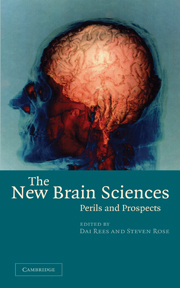Conclusion
Published online by Cambridge University Press: 08 August 2009
Summary
ISSUES EMERGING
Steven Rose began this book with a commentary on the spectacular advances in the neurosciences over recent years, the claims for their implications, and possible aspirations for the future. The chapters that followed have explained and explored many of these aspects in some detail. We now approach this concluding chapter with somewhat different perspectives because, unlike other authors, we have no personal distinction or first-hand knowledge in modern neuroscience or any of the cognate disciplines brought into the discussion such as philosophy, law or social sciences. We come from other areas of science, and from the oversight of medical research linked to issues of public interest and government policy. One of us (DR) has been more concerned with practical applications and industry, and the other (BW) with the parliamentary process and with public sensitivities to ethics and welfare. It is natural for us to look, as it were, down the other end of the telescope to ask questions not so much about neuroscience, philosophy, law, or social sciences in themselves, but about how the new developments might impact on everyday life.
The guided tour of the new brain sciences has certainly made us think again about humanity's understanding of itself and what this means for the norms and dynamics of social behaviour, for example how criminal responsibility should be decided in law; about the scope we already have through the use of drugs and which it seems will soon be greatly expanded by genetic engineering and stem cell technology, to redesign not only ourselves and our children but other people such as those that the politically powerful might think in need of ‘improvement’; and about the moral questions as to whether, if, how, and when, these new abilities may be used.
- Type
- Chapter
- Information
- The New Brain SciencesPerils and Prospects, pp. 265 - 275Publisher: Cambridge University PressPrint publication year: 2004
- 1
- Cited by



